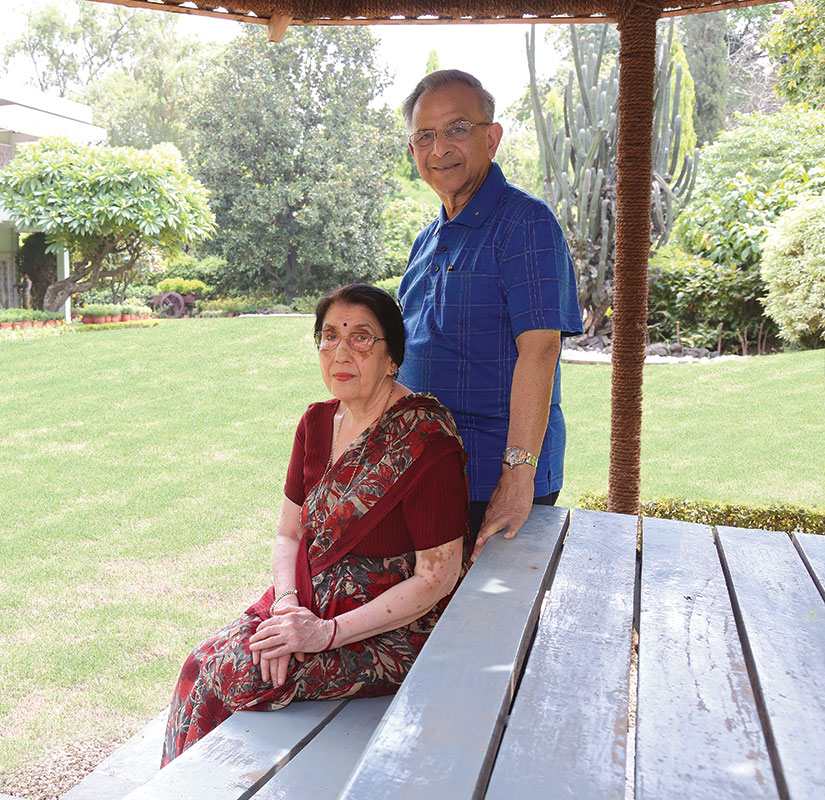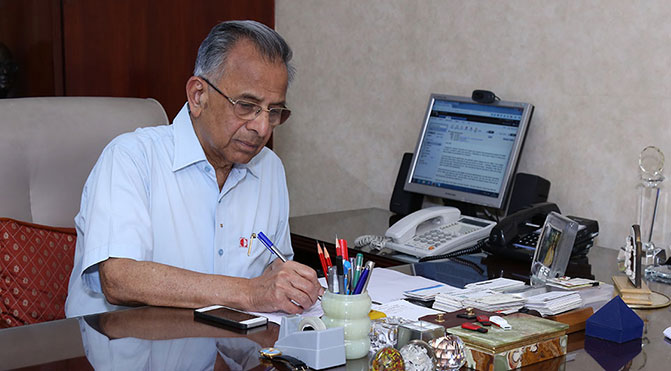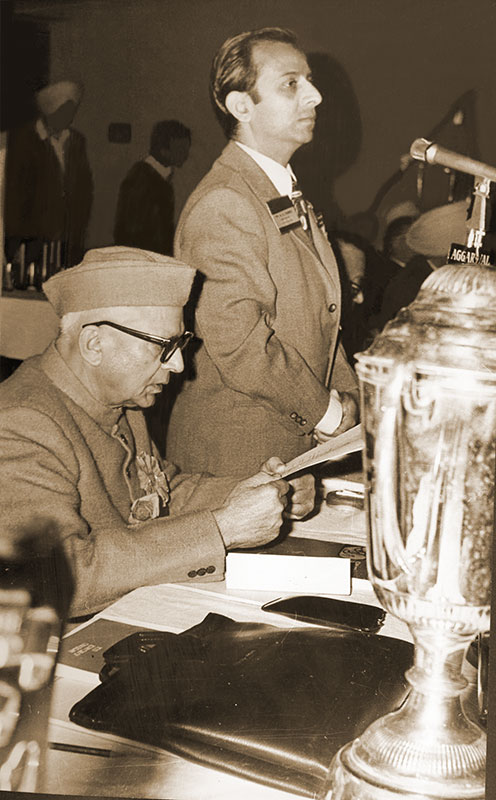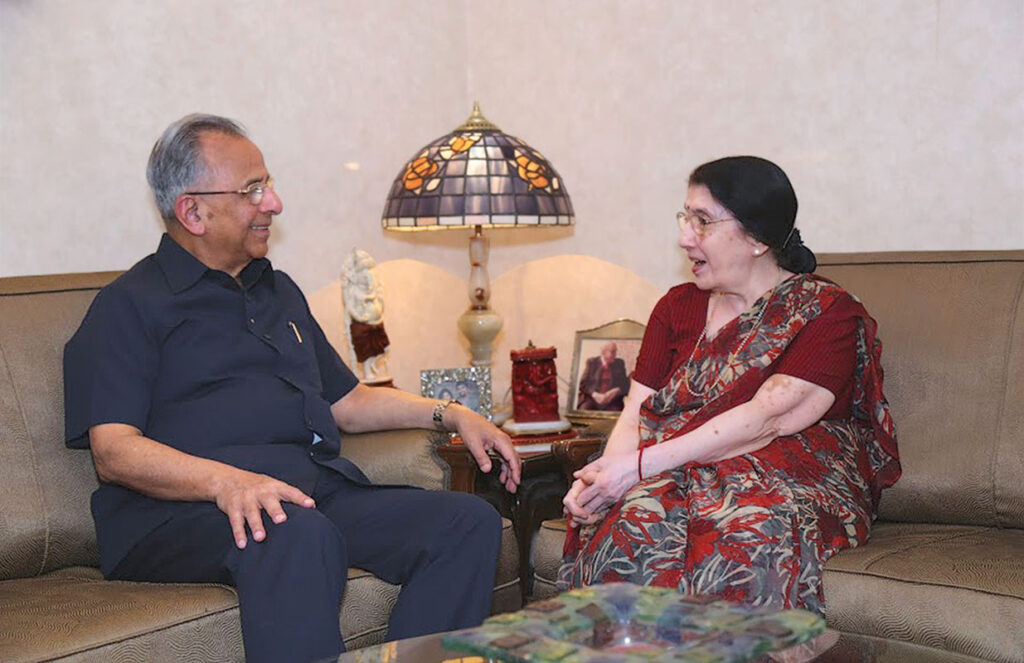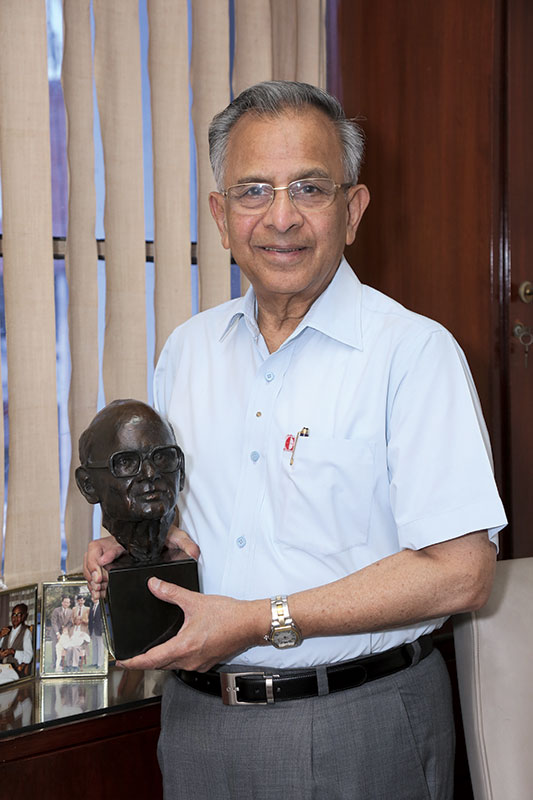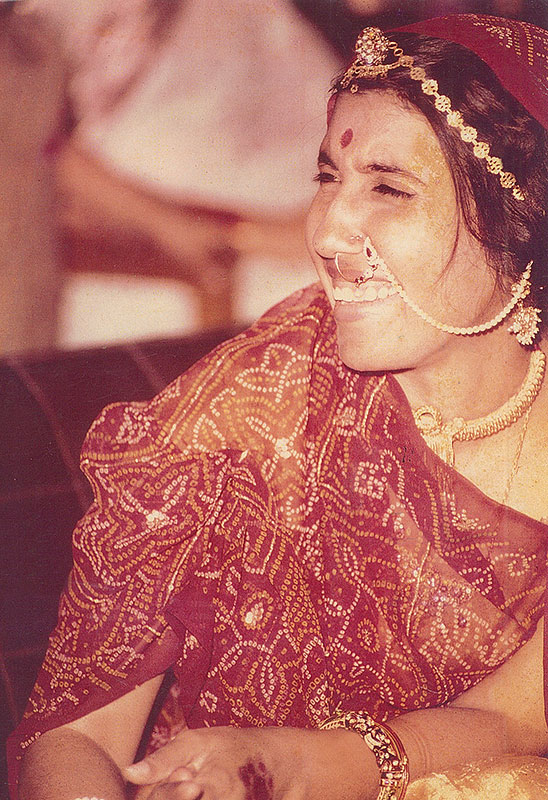The Raja of Rotary An account of a Rotary journey in India like no other. In a tête-à-tête, PRIP Rajendra K Saboo gives invaluable glimpses into his 55 years in service.
When asked if he is as active in Rotary as his father, Yashovardhan Saboo, elder son of PRIP Rajendra K Saboo, smiles and says, “The average of Rotary in our family is ok.”!
I am enjoying the hospitality of the Saboos at breakfast in their beautifully appointed house in Chandigarh. Despite nursing a bad cold, Usha is a gracious hostess, gently pushing me to finish the delicacies piled on my plate. The chickoo is incredibly sweet; “it’s from our garden,” smiles Saboo. And the huge Rossagulla is so fresh and so soft, that it has to be devoured. To an expression of guilt, Usha says supportively: “It is just sponge; dig in!”
Saboo’s Rotary journey is so captivating, fascinating and illustrious, and given his penchant for the smallest detail, the interview stretches far beyond breakfast, through a session in their sitting room, drive to his office, at his office, and later on telephone, as I have to board my flight!
Saboo was born in a Kolkata suburb, but those who have admired his oratory in English will be surprised to know that he underwent his early schooling in Hindi till Class 3 and 4 in Rajasthan during World War II and then up to Class 8 in a local suburban school near Kolkata. But in 1946, when his father, a high ranking executive who worked closely with industrialist G D Birla, was transferred to Kolkata, the son had to shift to the rather uppity St Xaviers School. Understandably, the teenager was very nervous at the interview and when the Jesuit priest, Father Van Buynder, asked for his age, he blurted out “12 o’clock,” instead of 12 years! The Jesuit Father made light of this blunder, perhaps took it as a challenge, admitted Saboo, and eventually became a mentor. A badly needed one for the young boy who felt totally out of place in the new school with his urbanised classmates and their slick English.
After graduating in B Sc (Hons) from St Xaviers in 1953 in Kolkata, Saboo joined Hindustan Motors, a part of the Birla empire, where both his father T C Saboo, and father-in-law, Durga Prasad Mandelia, were top executives. “My father had joined the Birlas as a clerk, and then rose to the topmost level, and established Hindalco.” But the son’s dream was to start his own business. After four years when he wanted to leave, it was difficult because of the close relationship with the Birlas. “But my mother was a very determined lady; she understood my earnest desire and convinced my father,” he recalls.
This job taught him the value of hard work, team work and forthrightness; he then started a venture to make industrial knitting needles, which evolved into a joint partnership with German collaboration. This brought him to Chandigarh in 1960 to set up one of the city’s first major industries.
In 1961, Saboo joined the Rotary Club of Chandigarh “not to be part of service, but to meet more people in the new town.” He knew about Rotary because his father was a Rotarian from the Rotary Club of Calcutta.
The Chandigarh club’s first project was a funeral van costing Rs 8,000 and each member gave Rs 200! “My salary, from my own company, was then Rs 2,500!” Slowly he got drawn into service projects, but was not interested in leadership roles “because my ambition was business.” In the corporate world, he was making good progress and became chairman of the northern region of the AIEI, which later became the CII. “Rotary was fine, but it was the beginning of my career and I had other ambitions, to go up the ladder in industry and business.”
But destiny had other plans for him. Suddenly his club president shifted to Delhi and despite his extreme reluctance, he was made vice president. He became the club president in 1970–71 and then chairman of the district conference. The district included Delhi and extended from Srinagar, right down to Western UP. For the district conference “I was able to get the Vice President of India to Chandigarh to inaugurate our conference. Bhichai Rattakul (who became RI President in 2002-03) was the RI President’s representative and we had speakers of stature like Karan Singh and I K Gujral,” says Saboo.
After that “everybody thought I was gunning for the DG’s post, but when it was proposed to me I said: ‘No I’m not going in that direction.’ Every time my club or friends tried to persuade me, I continued to say a firm ‘no.’” His focus was business and family.
Those days, governorship aspirants hosted lavish cocktail parties. “Addressing our club later, Bhichai said: ‘I predict that RK — at that time I was called Raja only in the family — has places to go in Rotary. I hope he does not go the way I’ve seen here in the district.’ His indication was the parties and the canvassing!”
Saboo studiously avoided contesting for the DG’s post till 1974, when he accepted, but laying down strict conditions: He’d not host, nor let anyone else host on his behalf, cocktail parties. No vote-seeking from clubs, no transport for those accompanying him to intercity meets, etc. These were accepted and he became DG at one shot, for 1976–77, creating a record in his district.
But, he says with a sigh, “the price was family life. Our younger son was just 12, and we took him to the International Assembly, then held in Boca Raton, Florida, US, so that he could see the expanse and wonder of Rotary… he was impressed but never forgot that Rotary took away his parents when he needed them the most — during his adolescent years.”
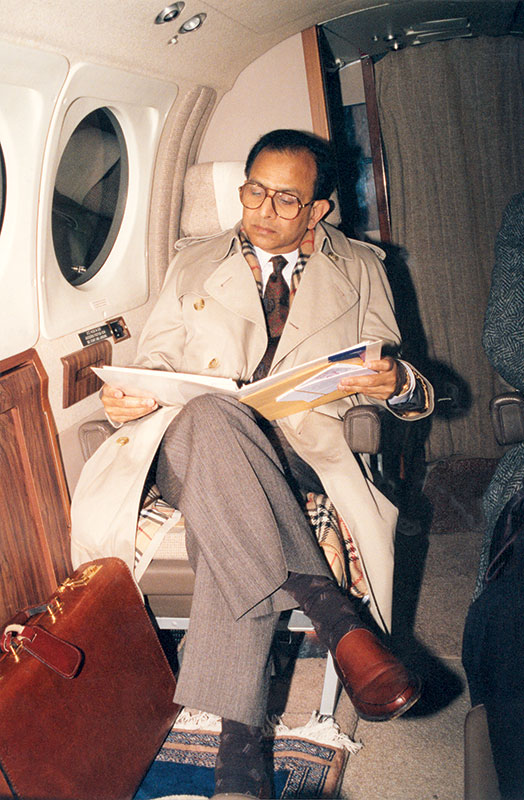
In Rotary’s history, how many DGs can boast of having both the President of India and Mother Teresa as speakers at their District Conference? Well, Saboo pulled off this feat. Both Saboo and Usha decided that Mother Teresa, being the epitome of service, should be invited. She was reached through his younger sister in Calcutta, and responded: “If god wills, I will come.”
With just three weeks to the District Conference, he could not take a chance, and met and invited the then (Acting) President of India B D Jatti. He readily agreed; but the same evening Mother Teresa too confirmed her participation! His dilemma was solved with President Jatti, the chief guest, agreeing to offer the Mother utmost courtesy.
Saboo says that when he took over as Governor, the District had 103 clubs already “which was a very large geographic area. The roads were not that good, the vehicles not as comfortable and the communication not as we see now.” His focussed area was “voluntary blood donation.” During his tenure he closed two non-functional clubs against the advice of many PDGs but he wanted to run the district on the 4-Way Test.
Immediately after his tenure, Saboo was picked up as International Assembly Discussion Leader (today’s Training Leader). While serving in the second year, the then incoming RI President Rolf Klarich invited him to be member of the RI 1981 Convention Committee.
Saboo and Usha were reluctant to get too many assignments, but he was persuaded to accept. At the very first meeting, he suggested Mother Teresa’s name as a speaker. “Everybody jumped at the name; it was accepted unanimously and the President said: ‘Raja, you’ll have to get her!’”
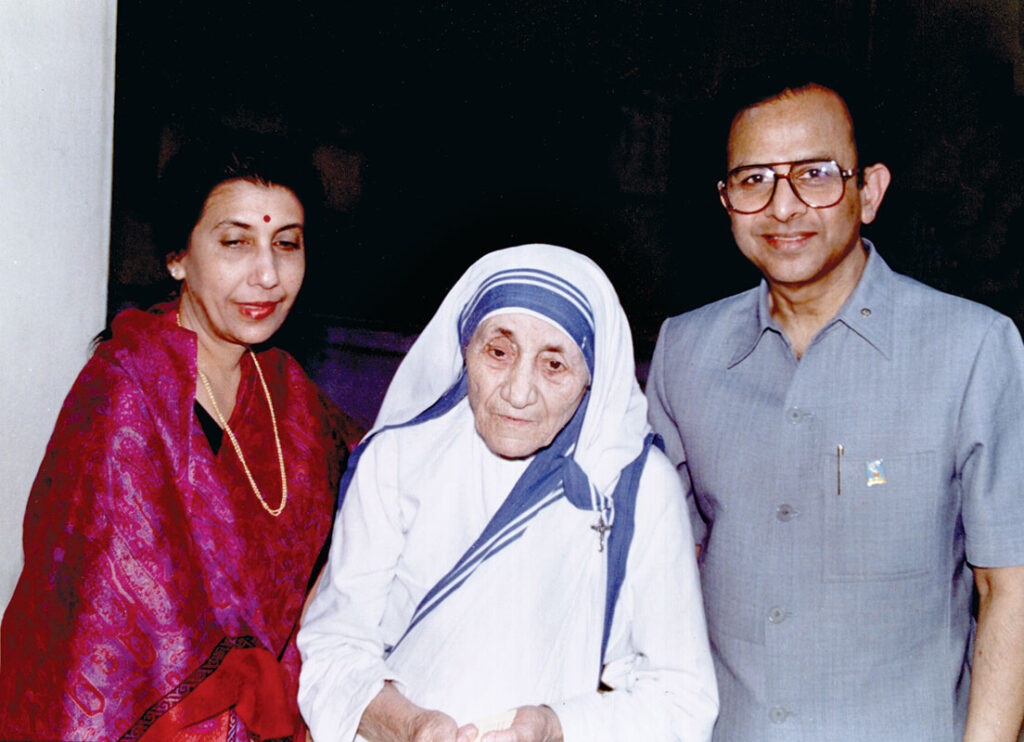
This time he went to her directly in Delhi, and again she said: ‘Child, if god wills, I’ll come.’ “So I said, Mother there is only one person who can communicate with God and that is you. So why don’t you call him and confirm? She laughed and said give me some time.” After many visits and the same answer, and only three months for the Convention, he told her, “Mother, with the utmost respect and humility, I request you to call him now. And she said, ‘Okay I will come.’ I said I am delighted, but my RI President in Finland won’t believe me. ‘Oh you want something in writing,’ she said, and tore a page from an exercise book and wrote her acceptance!”
But the persistent Rotarian wanted more! “But how would anyone know it’s your signature, I said. She said, ‘Oh you want a stamp,’ opened a drawer, took out a rubber stamp and put it on the paper and asked: ‘Are you happy now?’ I said yes, and sent it to the RI President.”
His only regret is that he didn’t keep a photocopy of it, though the RI archives would have the paper somewhere. When he and Usha received Mother Teresa and “asked for her baggage tags, she said: ‘Child, this small bag I am carrying is all I have, with a few sarees. What more do I need?”
Something significant happened in between. Saboo was invited by then RI President Jack Davis to speak as part of Voices of Asia panel at the 1978 Tokyo Convention. “These 7 minutes of speaking from the Convention dais, along with top leaders of the Rotary world, was intimidating, but perhaps gave me an exposure to the leadership of RI. I felt privileged,” he says.
From here to the RI Director’s position was “just a matter of chance, but also a sad part of my Rotary journey which I’d rather not talk about,” he sighs.
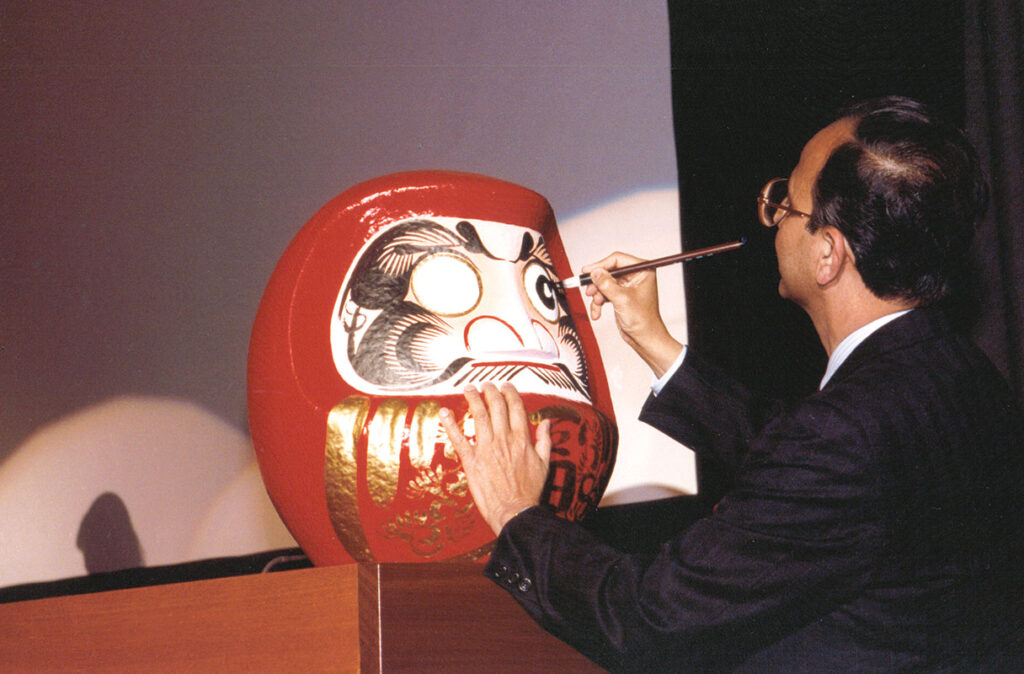
Saboo says that his two RI role models are RI Presidents Sir Clem Renouf (1978–79) and James L Bomar (1979–80). Both pioneered the crusade for polio eradication. “When President Jim (James) congratulated me, I told him that I had mixed feelings. If with this image of my country (his election as RID was challenged) I go on the RI Board, will I be taken seriously? I’ll never forget his words. He said: ‘Raja, your concern should be with what image of the country you will leave the Board!’”
So did it happen, I ask Saboo. “The day I attended the last Board meeting after a two-year term, President-elect Bill Skelton, who had visited India, was all praise for it, as also General Secretary Herbert Pigman, and a couple of Directors. Everyone gave me a standing ovation at the Board, and I felt totally overwhelmed remembering Jim Bomar’s words.”
Another highlight was the holding of the Presidential Goodwill Conference in Delhi in 1981 under the leadership of then RI President Stan McCaffrey, with the aim to promote peace and goodwill in the region. It saw huge participation from India’s neighbours — Pakistan, Bangladesh, Sri Lanka and Nepal. “We had to restrict participation from India and give district quotas, so that other countries could have sufficient representation,” he adds.
External Affairs Minister P V Narasimha Rao inaugurated it; Prime Minister Indira Gandhi attended the reception at Hyderabad House, top political and other personalities from our neighbouring countries participated. It was such a high-profile event that “we did not have to lobby for media coverage; on all the three days it hit the front pages of newspapers,” smiles Saboo. “It put Rotary right on top in people’s minds, leading General Secretary Pigman to exclaim: ‘Raja, you’ve set international convention standards in a regional conference!’”
The Delhi Declaration was drafted and adopted at the concluding session and the conference became a historic occasion. Setting up of the Rotary International South Asia Office in Delhi was another milestone.
Saboo continued to invest his energy and time in polio eradication. His name as a candidate in 1988 for RI President was put up, but he did not regret the outcome because his friend Paulo Costa from Brazil was selected. The next year, he didn’t want to put in his name, but was persuaded. Benny Santos from Philippines (who later became an RI Director), “a saint of Rotary and service personified, said, you have to put in your name now. Benny made Past RI President MAT Caparas also agree.”
But after putting his name, he was not enthusiastic or hopeful because traditionally it was the turn of an American. On D-day, he forgot all about it and was out of the house when the call came. His daughter-in-law Anuradha had to drive around the town to find and tell him that the RI headquarters was waiting for his call. He came home, received the call again, said, yes to the Nominating Committee Chairman and then Usha and his daughter-in-law cried as Usha and he would be away for two years!
His year as RI President was filled with action and international travel, particularly to Eastern European countries, where grateful heads of state admitted that Rotary coming to them was a certificate of their democracy! “It was a great year but I promised myself I wouldn’t build a statue for myself, and in this decision Usha was with me.”
His one “lurking apprehension” was that since he hailed from a country/ region that was still considered “third world”, how would he be perceived. He knew that Rotary being a “disciplined” organisation, he would always be respected “but would it be spontaneous”, was the doubt, which disappeared, when at the 1991 Assembly he declared his theme: Look Beyond Yourself. “This was received with a standing ovation that gave me the confidence that I had nothing to fear.”
How many DGs can boast of having both the President of India and Mother Teresa as speakers at their District Conference? Saboo pulled off this feat.
The reinforcement came at the Mexico Convention when as the incoming President he introduced as his family both his father and parents-in-law. “Usha and I sought their blessings on stage, and this was received with a standing ovation.” Never before had parents been introduced as part of the family. To Saboo, the head of the family were his elders.
A high point of his year was a UNICEF conference at UN which he addressed, along with Jimmy Carter, UN Secretary General Javier Pèrez de Cuèllar, Audrey Hepburn as compère! It celebrated 80 per cent universal immunisation of children worldwide.
There he painted one eye of the large Daruma doll; in Japanese folklore, a child paints one eye of the doll while making a wish and paints the second eye when that wish is realised. His wish was, of course, total eradication of polio. “That Daruma doll is still waiting for its second eye, and I hope very soon an RI President will be drawing the second eye on it,” he says.
A highlight of his year was Presidential conferences on Co-operation and Development “for more understanding on pressing issues such as hunger, economic development, literacy and sustainable agriculture. Other initiatives Saboo took were the ‘Service above Self’ award; a 5-year PR plan; greater focus on leadership, including PETS and more focus on retaining members.
Orlando, Florida as a Convention destination had its own challenges; Disneyworld and other attractions would compete. This was overcome by building these attractions into the programme! Meetings in the morning; entertainment, leisure in the evenings. “We got excellent rates for Disney World, which was exclusively reserved for Rotarians. And Universal Studios did the same. Even the fireworks were customised for Rotary,” adds Saboo.
As Trustee Chair Elect of TRF, he mooted the idea of Rotary Peace Centres to commemorate 50 years of Paul Harris’s death. “We had a very strong ambassadorial scholarship programme but it was not known like Rhodes or Fulbright scholarships.” A programme was envisaged for mid-career professionals with leadership capacity and eventually seven Centres for Peace and Conflict resolution were set up in reputed universities.
Rotary’s biggest gift
Ask PRIP Rajendra Saboo about the best gift that Rotary has given him and you get a lovely story. As RI President he had forbidden gifts, and was taken aback when greeted with a big carton while visiting Loveland, Colorado. Before he could refuse, he was told: “Please open it, if you don’t like it, we’ll take it back.”
He opened it to find a beautiful bust of his father; Loveland is the sculpting capital of the US. “They explained how they had taken pictures of my father from different angles at the Mexico Convention, where I had introduced him as my family. Look at their thoughtfulness and meticulous planning! I was overwhelmed,” says Saboo.
At a glance
Religion: I have a different definition; in Hindi it is dharm, but dharm is not necessarily believing in god, though I believe in God. It is how you adapt and conduct yourself. So that way I am a religious man, having a strong religious belief and strong faith in the power of prayer.
Music: Am not as ardent a votary of music as Usha is… particularly in classical music. She knows the ins and outs of classical music. In fact Amjad Ali Khan calls her sister and other famous musicians like Ravi Shanker have been here at the same dining table… I enjoy music, but am for lighter music. Of course, Mukesh was a very close friend.
Reading: I am not an avid reader but love to read writing that touches the human aspect.
Fitness: I spend 90 minutes in what I call health management. It includes yoga, pranayama, either a gym or a brisk walk outside. Of course when I travel, all this gets disturbed. I realise that I have to keep my body fit because I can’t afford a new wardrobe every six or 12 months!
Food: I am a vegetarian and enjoy different kinds of vegetarian food. I don’t take alcohol. I never was a habitual drinker, but on occasions would sip wine or champagne; not even social drinking. But once
I became President-elect of RI, I had to take a decision either I drink or I don’t drink. Because you can’t drink on selective occasions. From that time onwards, I’ve not been taking alcohol.
Future of Rotary: The world is changing and Rotary will have to change with the world. We’ve got to accept this, and yet retain our basic principles, our roots. If we tamper with that, then we will become like any other mushrooming organisation.
Movies: I am fond of movies… but I like to watch movies with happy endings, because I watch them for relaxation.
Women in Rotary: Their role is very important. I have always been for women joining Rotary and have always wondered why Rotary was so reluctant about taking them in. Some clubs still are.
Usha’s role: Usha has had a tremendous influence on me. She may not realise it but she has played a role, just as Rotary has done, in the thought process I developed, my values and approach to life. She’s been a great influence on my realising that the most important factors in successful leadership are modesty and humility. I should thank her for being the guiding light and insisting that you better retain the very essence of humility!
Rotary News is born
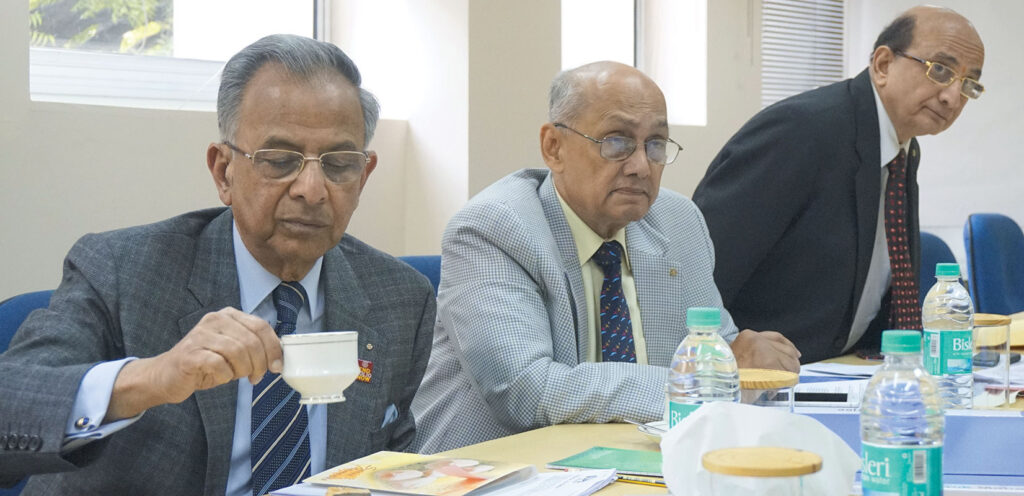
The recognition of Rotary News as a regional magazine happened when PRIP Rajendra K Saboo was RI Director. In 1979, he was asked by the Board to look at printing The Rotarian in India, as well as bringing out a regional magazine for India. “In those days there were foreign exchange restrictions and while GOI allowed the per capita Rotary dues to be remitted to RI, magazine dues were not allowed to be remitted. But we could print a magazine in India. The choice was to start a new Regional Magazine or revive the old Rotary News. I wanted to look at the options and since Rotary News was located in Bangalore, I contacted PRID (then PDG) Panduranga Setty to look at the possibility of starting a regional magazine.”
Meanwhile, Rotary News had seen different avatars and was bought over first by PDG Ramesh Pai’s Manipal Group. When approached, he was happy to handover the magazine completely, and thus in 1980 Rotary News got a new avatar. The Rotary News Trust was established and the first issue of Rotary News in a new avatar was released at the Calcutta Institute by RI President Bill Skelton in 1983. In 1981-82, it was approved by the RI Board as a regional magazine thanks to the initiative and leadership role of Saboo.
This meant that those who subscribed to the regional magazine need no longer subscribe to The Rotarian. George Paul was the first editor, and it shifted to Chennai in 1990, with PDG Viswanatha Reddy of Chandamama taking the printing responsibility here.
Keep Rotary simple: Usha Saboo
Rajendra K Saboo admits that spouse Usha has “played a tremendous role” in his mental makeup and thought process. She herself has said at many conferences that in the initial years she resented Rotary for taking up so much of her husband’s time. So over the years, how did she get so involved in his Rotary work, particularly the medical missions, I ask her.
“Well, I did my best. Before Raja dived into Rotary, I was myself busy doing some hands-on service in Chandigarh. We had a young family and I had to give up all my activities, because once you are in Rotary, you can’t say ‘No’; the merry-go-round starts! But I have no regrets… if I couldn’t do some things I wanted here (in Chandigarh), God gave me the opportunity for service in other manners in other places. The best thing Rotary has given me is international friendship.”
Those who’ve interacted with Usha know that within that tiny frame and behind the soft voice is a steel frame. And she neither minces her words nor pulls her punches. “Frankly, until polio came on the scene, I wasn’t very much impressed with Rotary because we were always talking about ourselves within the four walls of a hall, whether in the club, district, Institute or Convention. We were never really going out.
As a result, people really did not know what Rotary was or what it was doing. But after taking up polio, things changed because we went to every child on the street, and people started understanding that Rotary means good for everyone.”
While this helped strengthen her conviction of Rotary, “I still think that we need to get out of the hall. Unless we do that, people will not know much about us. But it is up to the leaders and not me to decide. My personal opinion is that out of the four monthly meetings, if one is held outside of the hall and with the community, it will be good for Rotary, but I don’t know what laws will need to change.”
She is okay, though not swayed, by the adulation Saboo gets from Indian Rotarians. “I don’t like so much applause, focus or appreciation. But that’s part of our Indian culture. I am very proud of Raja, but don’t agree with him always, and say so openly.”
Such an opening can’t be missed! So where does she disagree with him?
“Oh, please don’t ask me; so many times,” she smiles. For example, on the way Rotary meets are held in India. “The grandeur, the food part; I’ve always said the one permanent theme of Rotary should be to make and keep Rotary simple. And that’s where we differ because he says that you can’t enforce it on people. And I can see that people like it this way in India.”
But, adds Usha emphatically, “If you go to conferences in Australia or US, they keep things very simple, whether it is the meeting, the gifts or the food; everything is so simple. The focus is on the proceedings. Our focus is on other things. But then this is part of our culture, particularly in North India,” she shrugs.
Adds Saboo: “The last few years, unless essential, I’ve avoided going to conferences, or District training assemblies or such events, unless held in Chandigarh. We now want to preserve our energy for projects such as the medical missions.”
Well, those are the couple’s USP and will be covered in detail in a subsequent issue of Rotary News.

